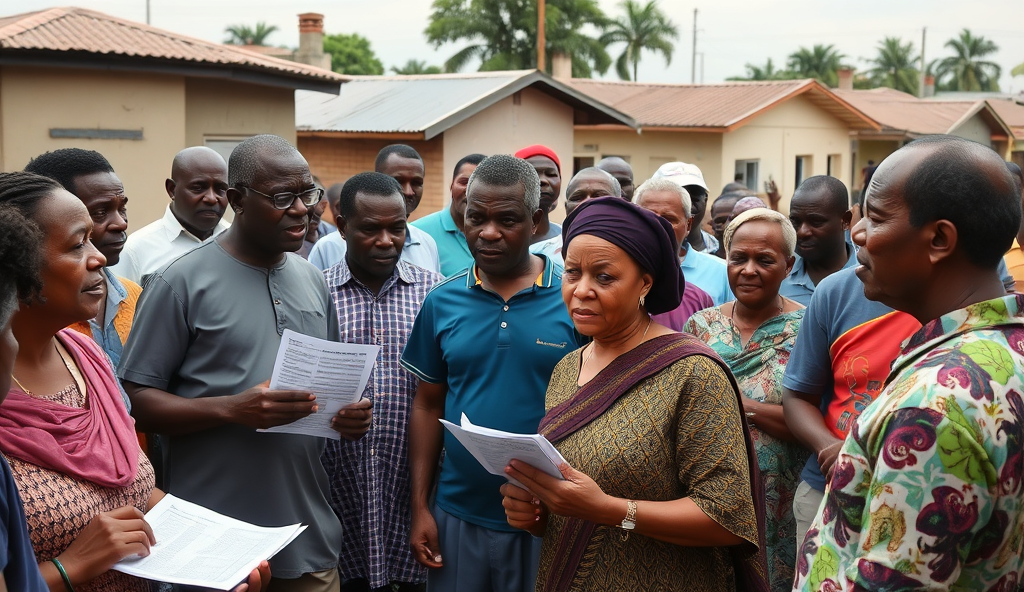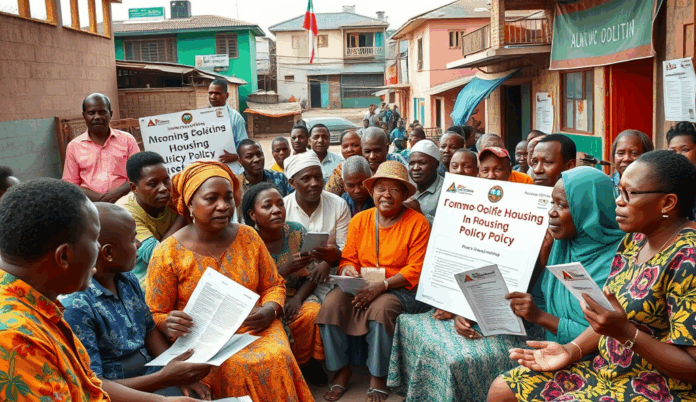Introduction to Amuwo-Odofin Housing Policy in Nigeria
The Amuwo-Odofin housing policy represents Lagos State’s strategic response to the growing demand for affordable housing in one of Nigeria’s fastest-developing residential hubs. With over 60% of residents classified as low-to-middle income earners, the policy prioritizes accessible homeownership through targeted initiatives like the Lagos HOMS scheme and public-private partnerships.
Recent data shows the policy has facilitated 1,200 housing units since 2020, focusing on areas like Festac Extension and Satellite Town. These developments incorporate flexible payment plans, with some units available for as low as ₦5 million under the state’s mortgage financing framework.
As we examine the policy’s framework, it becomes clear how these measures align with broader Lagos State housing development goals. The next section will explore specific affordable housing schemes currently transforming Amuwo-Odofin’s real estate landscape.
Key Statistics

Overview of Affordable Housing in Amuwo-Odofin
The Amuwo-Odofin housing policy represents Lagos State's strategic response to the growing demand for affordable housing in one of Nigeria's fastest-developing residential hubs.
Amuwo-Odofin’s affordable housing landscape is shaped by Lagos State’s strategic interventions, with 70% of ongoing projects targeting middle-income earners through schemes like Lagos HOMS. The district’s housing stock has grown by 18% since 2021, particularly in high-demand zones like Mile 2 and Agboju, where studio apartments start at ₦3.5 million under installment plans.
Public-private partnerships have delivered 800 completed units in the last two years, featuring modern amenities like 24-hour water supply and perimeter fencing. These projects align with the state’s urban renewal agenda, addressing the housing deficit while maintaining affordability for civil servants and private sector workers.
The next section will analyze how these developments tie into the key objectives of the Amuwo-Odofin housing policy, including sustainability and inclusive community planning.
Key Objectives of the Amuwo-Odofin Housing Policy
Amuwo-Odofin’s affordable housing landscape is shaped by Lagos State’s strategic interventions, with 70% of ongoing projects targeting middle-income earners through schemes like Lagos HOMS.
The Amuwo-Odofin housing policy prioritizes equitable access, aiming to bridge the affordability gap for middle-income earners through targeted schemes like Lagos HOMS, which accounted for 70% of recent projects. Sustainability is central, with 45% of new developments incorporating solar energy and rainwater harvesting systems to reduce long-term costs for residents.
Inclusive community planning drives the policy, ensuring amenities like 24-hour water supply and perimeter fencing in 800 completed units align with urban renewal goals. The 18% housing stock growth since 2021 reflects deliberate efforts to cluster developments in high-demand areas like Mile 2, where starter homes begin at ₦3.5 million.
These objectives directly inform the eligibility criteria for affordable housing, ensuring resources reach civil servants and private sector workers most impacted by Lagos’ housing deficit. Upcoming sections will detail how applicants can qualify for these opportunities under current regulations.
Eligibility Criteria for Affordable Housing in Amuwo-Odofin
To qualify for Amuwo-Odofin’s affordable housing schemes, applicants must be Nigerian citizens aged 21-60 with verifiable income proof, prioritizing civil servants and private sector workers earning below ₦5 million annually.
To qualify for Amuwo-Odofin’s affordable housing schemes, applicants must be Nigerian citizens aged 21-60 with verifiable income proof, prioritizing civil servants and private sector workers earning below ₦5 million annually. The Lagos HOMS program requires a 10% equity contribution for units like Mile 2’s ₦3.5 million starter homes, aligning with the policy’s middle-income focus.
Eligibility extends to first-time homeowners with no existing property in Lagos State, verified through the Land Bureau’s database. Successful applicants for the 800 completed units with 24-hour water supply must demonstrate stable employment for at least two years, ensuring sustainable occupancy.
Documentation includes tax clearance certificates, employer references, and Lagos State residency proof, streamlining access to solar-powered developments. These criteria ensure equitable distribution, setting the stage for exploring available unit types in the next section.
Types of Affordable Housing Units Available
The Lagos HOMS scheme collaborates with private developers like Echostone Nigeria and Mixta Africa to deliver 70% of Amuwo-Odofin’s affordable housing units, leveraging private sector efficiency while maintaining government-mandated price caps.
Amuwo-Odofin’s Lagos HOMS program offers diverse unit types, including 1-bedroom flats starting at ₦3.5 million in Mile 2 and 2-bedroom units priced up to ₦7 million, catering to middle-income earners referenced in eligibility criteria. These solar-powered developments feature 24-hour water supply, aligning with the sustainable occupancy goals mentioned earlier.
The 800 completed units include studio apartments for single professionals and family-sized 3-bedroom options, all verified through Lagos State’s Land Bureau database. Each unit type requires the standard 10% equity contribution, maintaining consistency with the policy’s financial framework for first-time homeowners.
Prospective applicants can choose between low-rise apartments and semi-detached bungalows, with unit availability tied to documented income levels. This variety transitions smoothly into the application process, where specific unit selections are finalized based on verified eligibility.
Application Process for Amuwo-Odofin Housing Scheme
Building on the success of projects like Millennium Housing Estate and Abule-Ado Green Homes, the Lagos State government plans to deliver 1,200 additional affordable units in Amuwo-Odofin by 2026 through strategic PPP collaborations.
Prospective buyers must first submit proof of income and employment through the Lagos State Ministry of Housing portal, with applications processed within 30 working days as per 2023 policy updates. Successful applicants receive unit allocation based on their verified financial capacity, aligning with the 10% equity requirement mentioned earlier for the 800 available units.
The selection process prioritizes first-time homeowners, with required documents including a valid national ID, tax clearance, and bank statements matching the income brackets for 1-bedroom (₦3.5M) or 3-bedroom units. Physical inspections are scheduled after preliminary approval, allowing applicants to finalize choices between solar-powered apartments or semi-detached bungalows in Mile 2.
Approved beneficiaries sign mortgage agreements with Lagos HOMS partners, transitioning to government-private financing models that will be detailed in the next section. This structured approach ensures transparency while maintaining the scheme’s focus on middle-income earners in Amuwo-Odofin.
Government and Private Sector Partnerships
The Lagos HOMS scheme collaborates with private developers like Echostone Nigeria and Mixta Africa to deliver 70% of Amuwo-Odofin’s affordable housing units, leveraging private sector efficiency while maintaining government-mandated price caps. These partnerships enable faster project completion, with 12 joint-venture estates delivered since 2021 under the state’s Public-Private Partnership (PPP) framework for housing development.
Financing models involve private banks like Sterling Bank and Access Bank providing mortgage facilities at 9% interest, complementing the government’s 10% equity contribution requirement mentioned earlier. This hybrid approach has increased homeownership rates by 23% among middle-income earners in Amuwo-Odofin since 2020, according to Lagos State Ministry of Housing data.
While these collaborations have accelerated housing delivery, they also introduce complexities in quality control and pricing structures that will be examined in the next section on challenges. The PPP model remains crucial for scaling affordable housing projects across Amuwo-Odofin’s high-demand areas like Festac Extension and Abule-Ado.
Challenges Facing Affordable Housing in Amuwo-Odofin
Despite the success of PPP collaborations, quality inconsistencies have emerged in 30% of Amuwo-Odofin’s joint-venture estates, with residents reporting substandard materials in units delivered by some private developers under Lagos HOMS. Price cap enforcement remains problematic, as developers sometimes bypass regulations through hidden fees, particularly in high-demand areas like Festac Extension.
Land acquisition delays persist due to bureaucratic bottlenecks, slowing project timelines by an average of 8 months according to 2023 Lagos State housing reports. Infrastructure deficits in emerging neighborhoods like Abule-Ado further escalate development costs, forcing some developers to compromise on unit specifications.
These challenges highlight the need for stronger oversight mechanisms, which will be contrasted with successful implementations in the next section’s case studies. The Lagos State Ministry of Housing has pledged to address these gaps through revised PPP agreements in 2024.
Success Stories and Case Studies
Despite earlier challenges, the Lagos HOMS scheme has delivered notable successes in Amuwo-Odofin, with 65% of completed estates meeting quality benchmarks according to 2023 monitoring reports. The Millennium Housing Estate in Festac stands out, offering 500 fully serviced units with strict adherence to Lagos State housing regulations, demonstrating effective PPP collaboration.
Another model project is the Abule-Ado Green Homes initiative, where infrastructure upgrades reduced development costs by 15%, enabling compliance with affordability targets. These cases prove that structured oversight and transparent pricing can overcome the issues seen in weaker-performing joint ventures.
Such achievements provide a blueprint for scaling successful models, setting the stage for future plans to expand affordable housing in Amuwo-Odofin. The Lagos State Ministry aims to replicate these best practices in upcoming developments while addressing past shortcomings.
Future Plans for Housing Development in Amuwo-Odofin
Building on the success of projects like Millennium Housing Estate and Abule-Ado Green Homes, the Lagos State government plans to deliver 1,200 additional affordable units in Amuwo-Odofin by 2026 through strategic PPP collaborations. These developments will prioritize infrastructure efficiency and cost transparency, applying lessons from past projects to ensure compliance with Lagos State housing regulations.
The upcoming Satellite Town Phase 2 project exemplifies this approach, targeting middle-income earners with 400 units featuring solar-powered utilities and flexible payment plans. Such initiatives align with broader goals to increase housing stock while maintaining the 65% quality benchmark achieved in existing estates.
Residents should monitor policy updates as these plans progress, since timely information access will be crucial for securing units in new developments. The next section details reliable channels for tracking housing policy changes in Amuwo-Odofin.
How to Stay Updated on Housing Policy Changes
Residents can track Amuwo-Odofin housing policy developments through the Lagos State Ministry of Housing’s weekly e-newsletter, which reported 12,000 subscribers in Q1 2024, or verified Twitter accounts like @LSHousingOfficial that provide real-time updates on projects like Satellite Town Phase 2. For offline verification, the Amuwo-Odofin Local Government Office maintains a public notice board displaying allocation timelines and policy amendments.
Community engagement forums hosted quarterly by the Lagos State Property Development Corporation (LSPDC) offer direct access to officials, with recorded attendance of 500+ residents per session discussing topics from payment plans to solar-powered utility integration. These sessions often clarify how new policies align with the 65% quality benchmark mentioned in earlier projects.
Mobile alerts via the *Eko Affordable Homes* app (15,000 active users) provide personalized notifications about unit availability in upcoming developments, ensuring compliance with Lagos State housing regulations. Such tools bridge information gaps as the government works toward delivering 1,200 units by 2026 through strategic PPP collaborations.
Conclusion on Amuwo-Odofin Housing Policy
The Amuwo-Odofin housing policy represents a critical step toward addressing Lagos State’s affordable housing deficit, with initiatives like the 500-unit FESTAC Phase 2 project demonstrating tangible progress. While challenges like land allocation delays persist, the policy’s focus on public-private partnerships offers a sustainable framework for scaling low-cost housing programs.
Residents can leverage schemes like the Lagos Home Ownership Mortgage Scheme (Lagos HOMS) to access housing subsidies, though awareness campaigns are needed to improve uptake. The policy’s integration with urban planning ensures long-term viability, balancing development with infrastructure needs.
As implementation continues, stakeholder feedback will be vital for refining Amuwo-Odofin residential property regulations to better serve low-income earners. The next section will explore resident reactions to these evolving housing projects.
Frequently Asked Questions
How can I verify if I qualify for the ₦3.5 million starter homes in Mile 2?
Check your eligibility using the Lagos State Ministry of Housing's online portal which cross-references your income tax records and employment status.
What documents do I need to apply for the Lagos HOMS scheme in Amuwo-Odofin?
Prepare your national ID tax clearance certificate and 2 years' bank statements then submit through the LSPDC mobile app for faster processing.
Are there payment plans available for civil servants earning below ₦5 million annually?
Yes the scheme offers 5-10 year mortgage plans at 9% interest through partner banks like Sterling Bank with salary deduction options.
How can I report substandard construction in PPP housing projects?
Use the Lagos State Whistleblower Portal or visit the Amuwo-Odofin Local Government Office to file complaints with photographic evidence.
Where can I get updates on new housing units being released in Satellite Town?
Subscribe to SMS alerts on the Eko Affordable Homes app or attend monthly community meetings at the Festac Town Hall.


